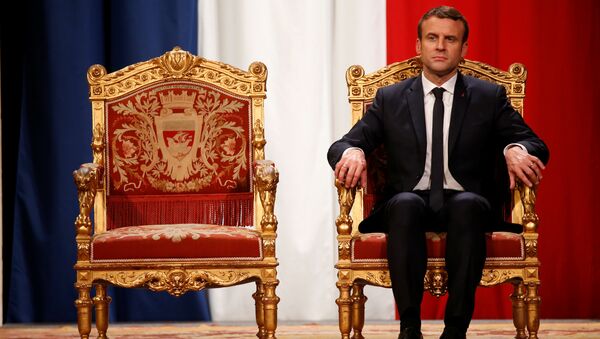Newly inaugurated French President Emmanuel Macron — who had been the finance minister under ex-President Francois Hollande's socialist government, but who left to form his own En Marche party — is set to have talks with German Chancellor Angela Merkel, May 15, in what is being seen as a crucial meeting for the future of the EU.
Merci à toute l'équipe @enmarchefr! pic.twitter.com/JIUdH7285H
— Emmanuel Macron (@EmmanuelMacron) May 12, 2017
Macron is a Europhile, but is keen to put his particular stamp on the EU, which has been dominated by Germany for decades. Although there has always been a strong Paris-Berlin axis, Macron is keen to put his personal stamp on shaping the future EU, which is deeply divided over the migrant crisis, sovereignty and the single currency.
During his inauguration speech, Macron pointedly referred to a "reformed and relaunched" EU and one that could run at "multi-speed" suggesting there could be consolidation within the eurozone member states, while those outside the single currency area could adopt trade-only status.
"We will reform and relaunch the Europe we need because it protects us and allows us to demonstrate our values to the world. France's role in the world is an eminent one. We will assume our responsibilities when it is called for. A timely response to the big crises of our era," he said.
He added that France was "on the verge of a great renaissance" after he was sworn in at the Elysee Palace, in Paris and pledged "to give back to the French people the confidence that for too long has been flagging."

Paris-Berlin Axis
His meeting with Merkel is being seen as a critical one for the Paris-Berlin axis and that Macron wants to exert more power in the future of the EU — France having already shown solidarity with the southern eurozone member states, which are struggling to stay within tough fiscal debt limits set largely by Germany.
Macron's win in the French presidential election is also being seen as a sign that his "multi-speed" EU plans could see Poland and Hungary sidelined in future decision making. Both countries are at loggerheads with Brussels over it Rule of Law policy.
In December, 2016, the European Commission officially warned Warsaw that it would remove its voting rights in the EU, if the Polish Government did not roll back controversial changes to its Constitutional Court.
The dispute arises from changes to Poland's Constitutional Tribunal, December 2015, when the Polish Government added five 'politically friendly' judges to the country's Constitutional Tribunal, in a move seen by critics as making it easier to push through legislation with less opposition.
Hungary is also under threat after the country passed a series of laws which curb academic freedom which some describe as an "act of political vengeance" in "another step towards unbridled authoritarianism" which politicians say is "destroying Hungarian democracy."
MEPs have hit out after the Hungarian Government passed a series of laws that could force the internationally recognized Central European University (CEU) out of the country and has also begun a national consultation against alleged EU policies.
#UN rights experts @ForstMichel & @davidakaye urge #Hungary to withdraw Bill on foreign funding to NGOs. https://t.co/KCn94BOnu0 pic.twitter.com/WzT85X7oV5
— The Observatory (@OBS_defenders) 15 May 2017
There was also an outcry after the Budapest government decreed that Hungarian NGOs that receive US$25,000 from foreign sources should have to register with the authorities and represent themselves to the public as foreign-funded organizations.
Macron — a staunch EU supporter — is likely to raise the Polish and Hungarian issues with Merkel when he meets her late May 15.



